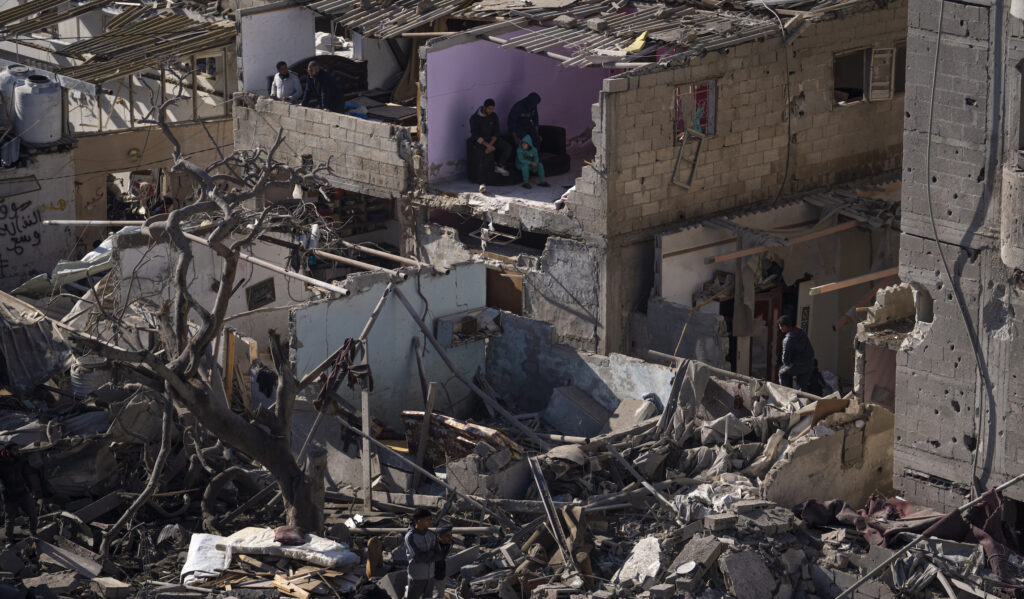Israeli Prime Minister Benjamin Netanyahu has revealed his plan for Gaza in the aftermath of the war, though it was quickly denounced by the Palestinian Authority.
Netanyahu presented his plan to members of Israel’s Security Cabinet on Thursday. His plan includes Israel maintaining security control of the West Bank and Gaza, the Palestinian territories, despite international calls for the creation of a Palestinian state, according to Reuters.
A major component of his proposal is his rejection of the “unilateral recognition” of a Palestinian state, and it noted statehood would be achieved through direct negotiations between Israel and Palestinians.
However, it did not specify with whom the Israelis would negotiate, which remains a significant unknown. The United States has urged for a “revitalized” Palestinian Authority to lead Gaza, in addition to the West Bank, as it does now, which Netanyahu has dismissed.
With Hamas out of power in the strip, his plan calls on Israel to work with local representatives “who are not affiliated with terrorist countries or groups and are not financially supported by them,” though it did not name anyone in particular.
The prime minister’s plan calls for Israel to have a presence along the Gaza-Egyptian border to prevent smuggling attempts.
“The prime minister’s document of principles reflects broad public consensus over the goals of the war and for replacing Hamas rule in Gaza with a civilian alternative,” a statement by the prime minister’s office said.

Another aspect of Netanyahu’s plan is the demilitarization and deradicalization of the strip. It also calls for the end of the United Nations Relief and Works Agency for Palestine Refugees in the Near East, known as UNRWA, and a replacement of it with other international aid groups. Israel alleged that some UNRWA employees participated in the Oct. 7 massacre in Israel that ignited the war.
The Palestinian Authority foreign ministry described Netanyahu’s proposal as “a plan to prolong the genocide against our people and an attempt to gain more time to implement the displacement plans” and argued the plan is “a blatant maneuver to intercept and thwart American and international efforts made to link stopping the war and releasing prisoners and hostages to resolving the conflict and embodying the Palestinian state on the ground.”
Israel is preparing to carry out military operations in the southern Gaza city of Rafah, which is where more than a million Palestinian refugees have fled over the course of the war. Israeli officials have said their operations would start on March 10, which coincides with the start of the Muslim holy month of Ramadan, unless the roughly 130 hostages are freed.
The Gaza health ministry, which is controlled by Hamas, said that roughly 29,000 people have been killed during the war. Its tally does not differentiate between civilians and combatants.
Israel’s military initially focused its operations in northern Gaza and steadily progressed south, as it urged Palestinians to flee south to avoid the battlefield. The result is that most of the Gaza population is now concentrated in Rafah, the southernmost city in the strip and along the Egyptian border. Hamas leaders and the hostages are also believed to be in or underneath the city, in the hundreds of miles of Hamas tunnels underneath Palestinian population centers.
CLICK HERE TO READ MORE FROM THE WASHINGTON EXAMINER
U.S., European, and Arab leaders, as well as humanitarian groups, have issued grave warnings about the possibility of overwhelming numbers of civilian casualties if Israel carries out full-scale operations in Rafah without evacuating civilians.
The U.S. does not support a complete ceasefire, unlike many other countries, because it does not want Hamas to remain in power in Gaza. However, it has continued to push for a temporary ceasefire that would last more than a month and would include the release of the remaining hostages in exchange for a significant increase in humanitarian aid.
